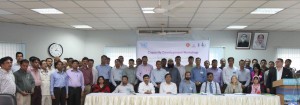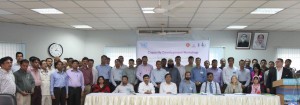

Mohammad Kawsar Uddin from Bytesforall Bangladesh is joing the capacity building workshop on ‘Open Government Data Sensitization, Gap Assessment and Strategic Planning’ that is being held in Dhaka from the 23rd of August till 25th of August. This is a culmination of earlier round table back that Bytes for All Bangladesh organized along with A2I and Bangladesh Computer Council in Dhaka on October, 2014. Mohammad Kawsar Uddin writes the following on his experience on the first day of the workshop.
To ensure transparency in government’s various works, Open Government Data (OGD) model will be implemented soon, Architect Yeafes Osman, minister, Ministry of Science and Technology, said while speaking as chief guest at the inaugural session of the three day long workshop titled ‘Open Government Data (OGD) sensitization, gap assessment and strategic planning’, organised by the Access to Information (A2I) project of the Prime Minister’s Office, UNDP and USAID in the conference room of the Bangabandhu Novo theatre in Dhaka.
OGD can be defined as government information proactively disclosed and made available online for everyone’s access, reuse and redistribution and restriction.
The workshop, which is attended by different government officials, is organised to increase awareness of the government officials and decision makers on important OGD issues, including the requirements and strategic priorities for advancing OGD initiatives in Bangladesh.
The minister said that in a well-functioning, democratic society, citizens need to know who their elected representatives are and what the government is doing. To do that, they must be able to freely access government data and information with their citizens.
Osman said that the present government is very transparent about its activities. “The government has ensured the citizen’s right to information. The national information portal bangladesh.gov.bd, developed by the A2I project has already ensured people’s right to access government’s information,” he said.
OGD will provide new economic opportunities, both for public and private sectors. Government can save money through the transparency benefits OGD brings as well as create jobs and develop skilled labour, the minister observed.
Speaking on the occasion, Anir Chowdhury, policy advisor, A2I project, said that in order to enhance OGD, an enabling environment with coherent legal and policy framework should be established.
There is a need for coherent vision and strategic framework for funding open data initiatives and for promoting open data.
This is in part, a result of limited understanding of the technologies required to deliver open data and the misinterpretation that this open data is an extra activity rather than integral part of government’s day to day activities, he said.
The A2I Policy Advisor said that the interest and willingness to share data may be different across different government’s agencies.
Raising awareness within the government and informing of the benefits of data sharing would be helpful in overcoming any potential reluctance, he urged. He also said that while developing OGD strategies, policymakers must keep in mind the safeguard of personal privacy and national security issues, especially as these can become a trigger for hiding data.
Abul Kalam Azad, principal secretary, PM office, Nazrul Islam, secretary (Coordination and Reform), Cabinet Division, Jason Smith, deputy director, Office of Democracy and Governance, USAID Bangladesh, Nick Beresford, deputy country director, UNDP Bangladesh, and Kabir Bin Anwar, director general, PM office and the director of A2I project, were also present and spoke on the occasion.
